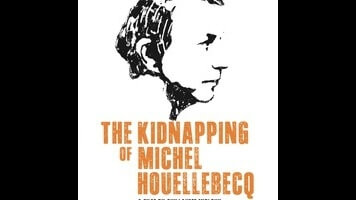Self-effacing meta-movie comedies—specifically, the kind that play with documentary techniques—constitute their own sub-genre, and if The Kidnapping Of Michel Houellebecq is never as funny as Incident At Loch Ness or as interesting as I’m Still Here, it may because it leans so heavily on the contrast between Houllebecq’s writing and his dumpy screen presence. Most of the jokes in Incident At Loch Ness work even if the viewer assumes that Werner Herzog is a fictional character; the Joaquin Phoenix featured in I’m Still Here is one, for all intents and purposes.
Kidnapping, however, is a fans- and detractors-only affair. At its worst, it feels like a highbrow transgressive-celebrity-cameo skit. (The telling difference between this and, say, Wayne Brady’s appearance on Chappelle’s Show is that Dave Chappelle goes out of his way to establish Brady’s clean-cut public persona as a character before the Training Day antics start.) In its better moments, Kidnapping moves as a mild and pokey social-cringe farce, a Curb Your Enthusiasm with duller teeth, in which a famous writer busies his kidnappers with conversations about Polish nationalism (“Poland exists! What’s this crap about ‘Poland was a dream?’” one of them eventually blurts out) and tries to talk them into getting him a prostitute.
There are the makings of a fourth, better joke here—namely, that the small gang of mostly Franco-Polish goons who’ve kidnapped the author make no attempt at concealing their identities, and accept at face value Houellebecq’s promise that he’ll tell police that he was blindfolded the whole time. It’s as though writer-director Guillame Nicloux were on the verge of hitting on something… well, not exactly profound, but at least memorable, about the place of an artist in a capitalist society. The character of Houellebecq implicitly understands that this is just a transaction, and doesn’t take it personally. It’s too bad that, like so much of the movie, this germ of satire is never developed past the point of premise.
Houellebecq, for his part, is the kind of peculiar screen presence who could never be mistaken for an actor. He has one of those prematurely old Harry Dean Stanton-type faces and is rarely seen without a cigarette between his middle and ring finger. His shoulders have a pronounced droop that makes it seem as if he’s sagging under the weight of his coat. Nicloux plays it up by surrounding Houellebecq with intimidatingly oversized figures, from girthy not-quite-ringleader Luc (Luc Schwarz) to bodybuilding-obsessed minder Mathieu (MMA fighter Mathieu Nicourt). Over and over, the movie returns to the image of the author, either handcuffed or limply holding a glass of wine, pressed between his kidnappers. It’s sort of funny.


 Keep scrolling for more great stories from A.V. Club.
Keep scrolling for more great stories from A.V. Club.